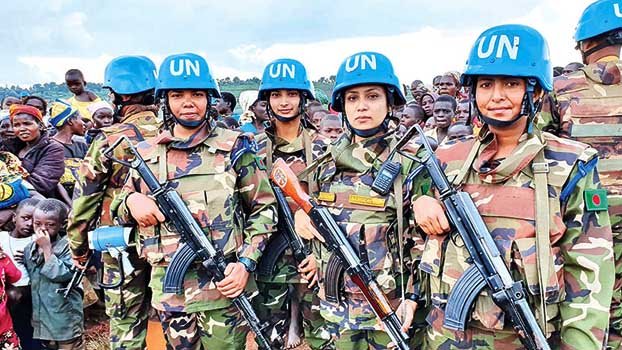Peacekeeping is a commitment of Bangladesh


Our Father of the Nation Bangabandhu Sheikh Mujibur Rahman, in his maiden UNGA speech in 1974, stated "Peace is an imperative for the survival of humanity. It represents the deepest aspirations of men and women throughout the world." This people-centric and value-driven proclamation has been the guiding principle for our engagement with the UN Peacekeeping Operations.
Indeed, for Bangladesh, peacekeeping is a commitment. A commitment that is aligned with Article 25 of our Constitution. Today, that Bangladesh’s peacekeepers are working in far-flung land to keep and maintain peace is, therefore, not an isolated event. Our participation in peacekeeping is manifestly linked to our foreign policy priority of seeking peace globally.
Under the able leadership of Bangabandhu’s accomplished daughter, Prime Minister Sheikh Hasina, Bangladesh remains a proud contributor to UN peacekeeping operations. Starting with a modest contribution in 1988, Bangladesh today is the leading brand name in the UN peacekeeping operations, with 6742 peacekeepers deployed in 8 peacekeeping missions. Our peacekeepers comprise both men and women and represent both our Armed and Police forces. So far a total of 1,76,669 Bangladeshi Peacekeepers have left their indelible footprints in 55 UN peacekeeping missions in 40 countries.
However, it is not just numbers that we celebrate. On the International Day of United Nations Peacekeepers, we celebrate our contribution to global peace and security; we renew our commitment to the values and ethos that underpin UN peacekeeping. On this day, we salute our peacekeepers for their hard work and sacrifice. We pay our most profound tribute to all the valiant peacekeepers who sacrificed their lives or got injured in the line of duty. The heavy price that we paid has only strengthened our resolve to serve the world with more vigor and dedication.
As our peacekeepers toil in distant shores, we must
also do our part to ensure their safety and security
and help them keep their morale high and unwavering
Bangladesh is one of the main proponents of women, peace and security agenda in the UN that spear-headed the landmark resolution UNSC 1325 under the leadership of Prime Minister Sheikh Hasina. I had the privilege to serve Bangladesh Mission in New York for six years and at the directives of Prime Minister Sheikh Hasina, I was able to engage our Women Peacekeepers, Police and Naval forces for the first time besides Army and Air force in the UN peacekeeping in increasing numbers. While I was lucky to make Bangladesh UN peacekeepers number one, I also helped increasing their benefits, wages and of course, their death benefits to a decent one that never been raised since 1992.
I must say the participation of Bangladeshi female peacekeepers is a bright spot in our peacekeeping journey. Today, Bangladeshi female peacekeepers have become symbols of hope and security for women, girls and children in many conflict-ravaged, war-torn societies. They are working side by side with their male counterparts, with even a wider outreach – to vulnerable women, children and families – reducing gender-based violence in post-conflict settings and providing a higher sense of security for them to live in their societies.
Bangladesh is now sending female civilian officers to peacekeeping missions such as female judges and prison correctional officers. As peacekeeping has evolved to encompass a holistic approach, Bangladeshi female military and police officers are effectively supporting the role of local women in various UN peace missions in building peace and protecting women's rights.
Imbued with the ideals of a culture of peace, our peacekeepers are holding our flag high as ambassadors of peace.
Peace is the only agenda that they pursue, easily winning the host population's ‘hearts and minds.’ No wonder, today we see a ‘Bangladesh Road’ in South Sudan, and Bangla as an official language in Sierra Leone.
As our peacekeepers toil in distant shores, we must also do our part to ensure their safety and security and help them keep their morale high and unwavering. I can assure you that the Ministry of Foreign Affairs is doing its best and is continuously negotiating with the UN and other relevant stakeholders so that our troops are safe during deployment and that their services are adequately compensated.
During this global Pandemic, our peacekeepers continue to serve in various peacekeeping missions as frontline fighters. Even during the recent volcanic eruption in DRC, our peacekeepers there remain faithful to their duties.
We remain confident that the commitment and integrity with which our peacekeepers serve to uphold peace will continue to project a peace-loving Bangladesh abroad and help achieve sustainable peace for the international community.
Before I conclude, let me draw one pertinent issue and it is Culture of Peace. Bangladesh is not only engaged in UN peacekeeping and Peace building missions, it spearheaded a resolution known as “Culture of Peace” that is accepted by all 193 countries of the UN. The basic element of COP is to create a mindset of respect and tolerance towards others irrespective of ethnicity, color, race or religion and if we can create such a mindset we can surely achieve a sustainable world of peace and stability across nations and then there won’t be exodus of persecuted Rohingya from their homes or 80 million refugees in the world or no need for “Black life matters” movement. Let us join hands to achieve such a mindset.
Dr. A.K. Abdul Momen is Foreign Minister of Bangladesh.



